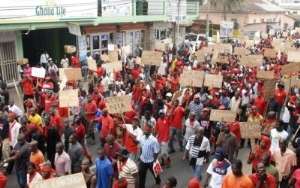
UK-based Ghanaian Petroleum Economist, Theophilus Acheampong, has urged government to meet leadership of organized labour to prevent a planned nationwide demonstration.
According to him government must find a proper approach of dealing with the intended series of demonstrations by the labour unions in the country to enhance productivity.
Theophilus Acheampong made the call Monday on Adom FM’s “Burning Issues” programme hosted by Afia Pokua.
“Government needs to sit down with organized labour concerning the recent hikes due to the drastic reduction in petroleum products on the international market” the Ernergy expert stated.
Following the hikes in utility and petroleum prices, Organised Labour demanded for a 50 percent increase in salaries of public sector workers.
However, several meetings between the Trades Union Congress (TUC) and government have failed to reach a deal.
TUC have subsequently set out a roadmap for demonstration and other industrial action to force government to succumb to their demand.
Organised Labour would embark on a nationwide demonstration on Wednesday January 20, 2016, starting from 0730 hours from the Obra Spot in Accra.
The demonstration would run concurrently throughout all the regional capitals.
Theophilus Acheampong said it is the constitutional right of organized labour to register their displeasure against government because of the petroleum price hikes despite a fall in price of crude oil on the international market.
As at January 18, 2016 the oil price has recovered slightly after earlier falling below $28 a barrel, as the Organization of the Petroleum Exporting Countries (OPEC) predicts crude will mount a recovery this year.
Brent crude, used as an international benchmark, fell as low as $27.67 a barrel, its lowest since 2003, before recovering to trade at $28.86. The price of US crude was $29.65 a barrel after hitting $28.36.
Investors fear the lifting of Western sanctions on Iran could worsen the existing oversupply problem, however, oil producers' group OPEC said in its January market report that it expected to see the price of crude begin a rebalancing process in 2016.
Mr Acheampong adds that despite the hikes in utility and petroleum prices government has not increased wages of workers.
He advised government against taxing citizens to generate more revenue.




 We’ll no longer tolerate your empty, unwarranted attacks – TUC blasts Prof Adei
We’ll no longer tolerate your empty, unwarranted attacks – TUC blasts Prof Adei
 Bawumia donates GHc200,000 to support Madina fire victims
Bawumia donates GHc200,000 to support Madina fire victims
 IMF to disburse US$360million third tranche to Ghana without creditors MoU
IMF to disburse US$360million third tranche to Ghana without creditors MoU
 Truck owner share insights into train collision incident
Truck owner share insights into train collision incident
 Paramount chief of Bassare Traditional Area passes on
Paramount chief of Bassare Traditional Area passes on
 Two teachers in court over alleged illegal possession of BECE papers
Two teachers in court over alleged illegal possession of BECE papers
 Sunyani: Victim allegedly shot by traditional warriors appeals for justice
Sunyani: Victim allegedly shot by traditional warriors appeals for justice
 Mahama vows to scrap teacher licensure exams, review Free SHS policy
Mahama vows to scrap teacher licensure exams, review Free SHS policy
 Government will replace burnt Madina shops with a new three-story, 120-store fac...
Government will replace burnt Madina shops with a new three-story, 120-store fac...
